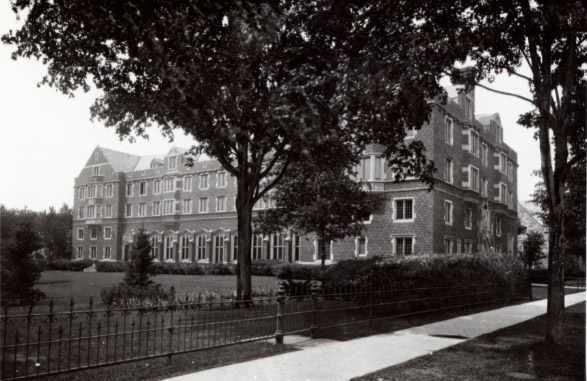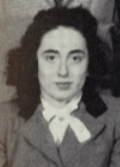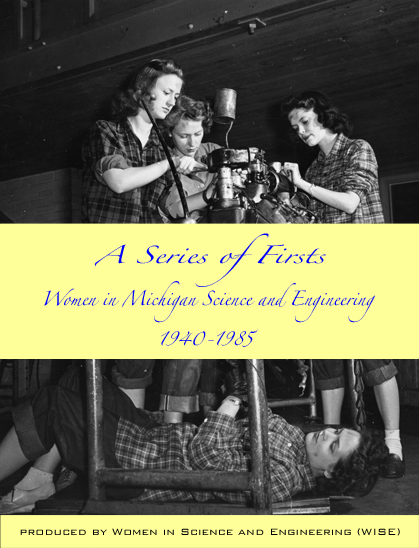Fay Ajzenberg-Selove
Fay Ajzenberg-Selove graduated in 1946 with a Bachelor of Science in Engineering Physics. She later earned a Master of Science in Physics in 1949 and a Doctor of Philosophy in Physics in 1952, both from the University of Wisconsin. She did post-doctoral work at the California Institute of Technology, writing the first of a series of major review papers on the nuclear spectroscopy of the light nuclei. She continued this work and experimental research for thirty-eight years while teaching at Boston University, Haverford College, and the University of Pennsylvania.
Growing Up
Listen to Fay describe her family and how they immigrated to America.
FAS: My family consisted of my father, whom I adored, my mother, whom I didn't much care for, a sister who is, fortunately, alive and fifteen years older than I am, and me.
KW: You grew up in France correct?
FAS: Yes, but I was born in Germany. My parents left Russia in 1919 and stopped in Germany until 1930, and I was born there in '26. And then I lived in France from 1930 to 1940, and then the war came and from then on it was messy.
KW: So, after that you've been in the US ever since?
FAS: Yes, except, that it took some time to get there. We went along the coast, the Atlantic coast, and with a lot of other people, and then we were lucky enough to be able to get into the so called unoccupied France, and from there on we went to Spain, Portugal, the States briefly, and then to Cuba. And from there we got immigration visas.
KW: Well you have seen a lot more of the world than I have.
FAS: It was not because I wanted to.
KW: Right. Right. Did you know any engineers or people in the sciences when you were growing up?
FAS: Yes. My father.
KW: What did your father do?
FAS: Well, my father was a genius in his own way. He came from a very poor family in Warsaw, which then belonged to Russia, and even though he was a Jew, so this was very rare, he got a scholarship to go to the equivalent of MIT in Russia. It was called the Mining Academy. In St. Petersburg, in Leningrad afterwards, but then it was St. Petersburg. And he finished with distinction and as a condition of the scholarship he first had to be a coal miner, and then he became a mining engineer. In 1919, he disliked of course the regime very much and he took a locomotive at the point of a gun, and drove the locomotive, my mother, and my sister, and a little bit of money through the various warring factions, and landed in Germany. Where he became an investment banker. As you know there was a terrible Depression. Terrible, terrible. And so he lost it all, and owed a lot of money. But then he went to France and there he gradually repaid his debts, and through my uncle, my mother's brother, he became a millionaire again. He owned part, about a tenth, of ten or eleven factories. And then came the debacle, and we decided to just go south as far as we could. We didn't have any visas to go further than France. And then all of a sudden Petain, the Supershit, made a deal with the Germans that no one in the Atlantic zone could move to the unoccupied so called region, as of that date, and Dad faked papers and we got into a town which was not occupied: Toulouse. And from there on we found that in order to get visas to get out of France, we had to go to Marseille, which was occupied by the Italians, who were much nicer. And we got, surprisingly enough, exit visas from France and then transit visas through Spain and Portugal. And in Portugal it was a real mess because it was the end of the universe; and we were lucky and we tried to go to England because Dad wanted to continue the fight, but they were having terrible difficulties. And so, we were able to get a visa to the Dominican Republic because they wanted people who were technically competent. We transferred through New York and loved it, and found that in order to become immigrants we had to go outside and the consul for the United States in Canada was reputed to be an anti-Semite, so we went to Cuba and there they gave us the immigration visas almost immediately because I been born in Germany. And so, as far as the Germans were concerned I was a Pole, but as far as the Americans were concerned I was a German, and the German quota was open. And so they took me, and because of me they took my family.
Listen to Fay talk about how her father sparked her interest in science.
FAS: I can't imagine any time when I was not interested, because I adored my father, and my mother was a very good musician, but I didn't like her very much and I didn't like her friends. And I adored Dad, and since he was basically an engineer I wanted to be that too. He didn't push me, but he was a hero for me and sure I wanted to be like him. I never had a doll. I was given presents of money, you know small amounts of money, and erector sets and things like that.
University of Michigan
Listen to Fay discuss how quotas impacted her decision to attend U of M.
FAS: It was my second choice. My first choice was MIT and I was interviewed by an alumnus who was kind enough to tell me that there were numerus clausus, you know what that is? They only took certain number of people. Numerus clausus for Jews and a numerus clausus for women and I didn't make it. So the second place was Michigan and they admitted me but without any financial aid. I had all sorts of small jobs when I was there.
Listen to Fay talk about her interactions with her classmates.
FAS: I think I was the only woman. It's a little hard to remember sixty years later. But I can tell you, that my feeling was that I was the only woman. There were about a hundred guys in the engineering class that I was in, and they were wonderful to me. They treated me like a rather naive- and I was- younger sister. They took me on their drinking expeditions. They took me on their expedition for finding women, you know, to go to bed with, but me they treated like a wonderful younger sister. And I must tell you that that is the most important thing that I got out of Michigan, and that is the feeling that I am very comfortable with men. I am clearly a feminist for other people. I want other people to have opportunities. I have, except for one case in which I sued and won because they didn't want me, I've always felt so comfortable with men.
Listen to Fay describe living in Martha Cook including her friendship with Papa Doc.
FAS: Yes.
KW: Can you tell me a little bit about what that was like?
FAS: Oh, that was terrific place to live. I was lucky in that I had a single room, it was lush. The food was excellent. I had really no interactions with the girls. They were all very pleasant, but I'd very little to do with them. There were only three or four who planned to use the knowledge, other than as being very good wives. There was one very, very bright woman who married a man who became a senator. But except for her, they were nice women but nothing to do with me.
KW: What was the social atmosphere like? What did you like to do on weekends?
FAS: I liked to go out with some of the guys. As you probably read, one of the guys that I went out with eventually turned out to be Papa Doc. He was a very fine, gentle, intelligent man, who had terrible difficulties speaking English and being comfortable in the environment. And I of course had absolutely no bad feelings about blacks. I didn't understand the United States, in that respect. I couldn't conceive of bigotry. And I liked him. And when a couple of times we went to Martha Cook to have coffee, I mean there was an explosion and we had a lot of trouble getting coffee anywhere else for that matter. But he was a wonderful guy and he became of course very anti-American.

Martha Cook Residence, circa 19401
Listen to Fay discuss the impact World War II had on her experience at U of M.
FAS: Yes.
KW: Can you tell me any impacts that the war had that you remember?
FAS: Well you see, the kids who were there, the guys who were there, were part of a V-12 program. What it is is that they were going to go into the Navy, and they were being prepared by taking various courses. l kept worrying about my family in Europe. All but two did not survive. And, but except for that there was no direct impact. I'd tried to join the WACS, but I couldn't pass the physical exam and I was too young, and I was not an American citizen so none of that worked. I joined the Civil Air Patrol, which meant that I drilled and learned navigation, why for I don't know, and learned to shoot and enjoyed guns. And you know that there was nothing much that I could do: by the time the war ended I was 19.
Listen to Fay talk about her professors and the difference between her classes at U of M and those at Columbia.
FAS: As far as I remember they treated me all right, but they were mainly very old. They were the people who did not go and work in war related professions. And they were not very good. I finally switched from engineering to physics because that was the only place where there was a guy who had seemed to enjoy himself.
KW: What was his name? (Floyd Firestone) Was he particularly memorable? (He enjoyed teaching.)
FAS: I'm sorry?
KW: I was just going to say, was he pretty influential then for you, this physics professor?
FAS: Influential, I don't know. But I enjoyed him. But I learned very, very little while I was at Michigan and that caught me badly when I went to graduate school at Columbia where l was not a regular student but I took classes, and promptly failed four out of five courses. But I loved it. It was physics, it was taught by people who were first rate. They all got Nobel Prizes. And they were just a different calibre of person. And I enjoyed it enormously. And I made lots of friends and I had a good time.
KW: So you would say that your classes that you took at Columbia were much more useful than what you took at the University of Michigan?
FAS: Oh, yes.
Career and Family Life

Listen to Fay describe her first jobs after graduation.
FAS: My first job was at a community college in Chicago teaching a hundred and fifty students who had come back from the war, and who needed training in first year physics. And then after a while I went to get a Ph.D. at the University of Wisconsin, and there once again I failed a course. But I did a lot of good work in research and when I finished, I had the support both of people at Wisconsin, one of whom became a very close friend of my husband and of me, he was just wonderful to us both. And I got a job at Caltech, the first women they had had.
KW: What was his name? What was the name of the man that was a good friend of you and your husband?
FAS: Heinz Barschall. H.H. Barschall. B-A-R-S-C-H-A-double L. He was a professor at Wisconsin; he had the best students and I was not one of his students. But he was wonderful to me. So was my major professor, but it was not the same thing. This guy was terrific, and he stayed a friend. And later on when I had bad cancers, he brought us all sorts of research papers and helped Wally and me decide what to do and so forth.
KW: So you later went to do research then?
FAS: Yes, at first I wanted to do research. I had no question that I wanted to teach. So my first job was the summer after I got my Ph.D. at Caltech; I did research and in the fall I was doing a one-year job for someone who was on sabbatical leave at Smith College.
Fay Ajzenberg-Selove, 19462
Listen to Fay talk about how she fought the University of Pennsylvania over gender discrimination in regards to her job requirements.
FAS: No, certainly not at Smith. Because it was primarily women and at Caltech, not at all. I was so different and everybody was warm and terrific to me.
KW: What about your kind of professional career as a whole? Were there any times that you felt you were treated differently because you were a woman?
FAS: Oh, yes.
KW: Can you give me some examples or describe...?
FAS: Yes, l can tell you one example. I was a...I had decided to leave a small college called Haverford, for no reason having to do with being a woman, l just couldn't stand the president of the college. It was a new president and he and I were disagreeing on important things for the college. And so I couldn't leave the area because my husband was a professor at the University of Pennsylvania. So one of my friends said that I could become a research professor, and I could teach as much as I wanted to. That to me was very important. And I thought there wouldn't be any problems, because I knew that most of the professors didn't like teaching undergraduate courses and I did. Everything went well until I arrived at Penn, and then the guy I was supposed to work with on research, as well as teach, decided that he didn't want me. He had the backbone of a wet noodle and he was somebody who considered me too well known. So all of a sudden all I could do was do research and not teach, and I was very unhappy. So l tried to work this out and I couldn't, and so I made a request to the State Human Relations Commission, which worked also for the federal government, and said I was being discriminated on. And after an unpleasant couple of years, they found in my favor and gave Penn the alternative of either being sued by the federal and state government, in which case if they had lost they could have lost half a billion dollars, or taking me retroactively. And so they did. And the beautiful thing was I had kept my cool by using a lot of tranquilizers, because I have a very bad temper, and I didn't want to lose it. And I stayed cool. So did they. And I found that as I wrote in the book that if you win, then the guys accept you. And I've been completely comfortable at Penn. I have worked on all the committees of the university. I have felt completely comfortable. There are now finally women in the physics department and at the University. I was only the second woman at the university, in the college of liberal arts. And I got lots of help from lots of people, and it has worked out beautifully.
Listen to Fay describe how she met her husband through her friend Marietta Bohr, Aage Bohr's wife.
FAS: Yes (laughs). It was not quite Romeo and Juliet, but it was almost like it. I don't know if you have heard, I'm sure you have, of Niels Bohr.
KW: Yeah.
FAS: His son, Aage Bohr, also won a Nobel Prize, and he and his first wife were very close friends of mine, because they were very close friends of the people at Caltech. And one day she came to visit me when I was at Boston University and she told me I had to get married. And I said 'yes, but I haven't seen anyone I really want to marry'. So she said, 'Give me an idea. Tell me whom you might like.' And so I mentioned a guy we both knew, who was not married of course. And she said 'You're stupid. You don't understand yourself. I met the guy for you the evening before at a cocktail party.' He was an assistant professor at Harvard, and I had seen him around, but I didn't...he didn't appeal to me. She was a very domineering, in a delightful way, woman, her name was Marietta. And Marietta said, 'I'm not going back to Denmark unless you promise to meet him.' So he was giving a talk quite soon after, and I went and sat in the first row. And I fell in love with him. And I wanted to go to bed with him. And so for the next four or five months I worked on him in every possible way. I got myself invited to places where he would be. I got fake tickets to the opera, in case he could make it. It didn't work. And then one day I came back from a trip, and he met me at the airport and we went to bed. And four months later we were married.
KW: So all your hard work paid off?
FAS: Yeah. I'm mad about him. We have been married for 51 years.
KW: And he is a physicist as well, correct?
FAS: Yes, but in a different field. We have never worked together, except once when it was a political thing. We're in different fields. We get our money differently. When we were teaching the decision about what we were teaching and how much we would be paid was made by the chairman. I once got off a committee that was considering an idea of his. So we have been totally independent.
Advice
Listen to Fay's advice to young women pursuing science.
FAS: Be comfortable with men.
KW: You said earlier that's kind of one of the most important things that you learned at the University of Michigan.
FAS: Yes.
KW: How exactly did you go about being comfortable with them?
FAS: It was their behavior. I just followed them. And they were so wonderful, and we had so much in common compared to what I had with the women- very nice women at Martha Cook- that it worked by itself.
KW: Would you say most of your close friends then while you were at the University of Michigan were men?
FAS: Yes. And I have four people that I think of, as my demi-semi-gods, and they are all men.
2. Michiganensian, 1946, p. 201
Women In Science and Engineering
1140 Undergraduate Science Building
Ann Arbor, MI 48109
ph: 734.615.4455
e: umwise@umich.edu







